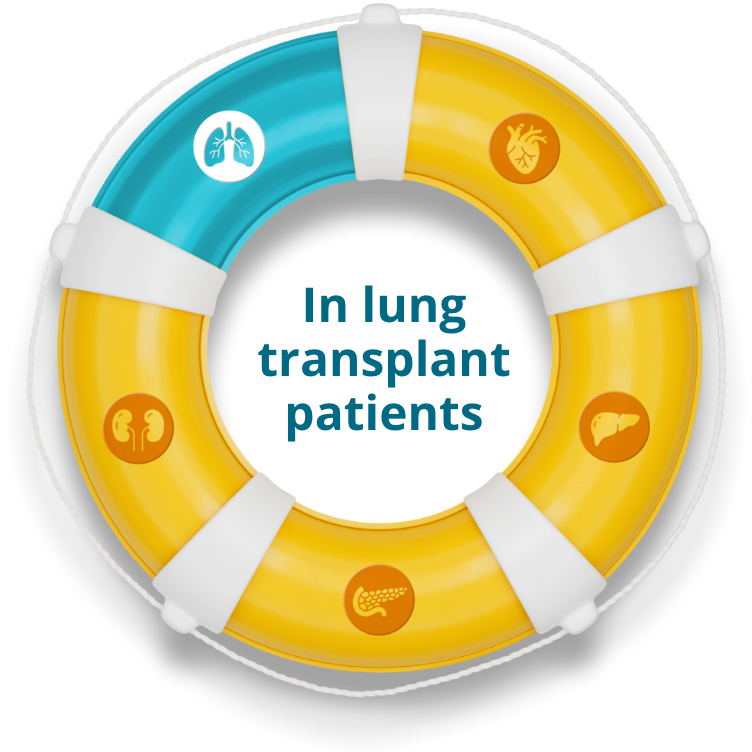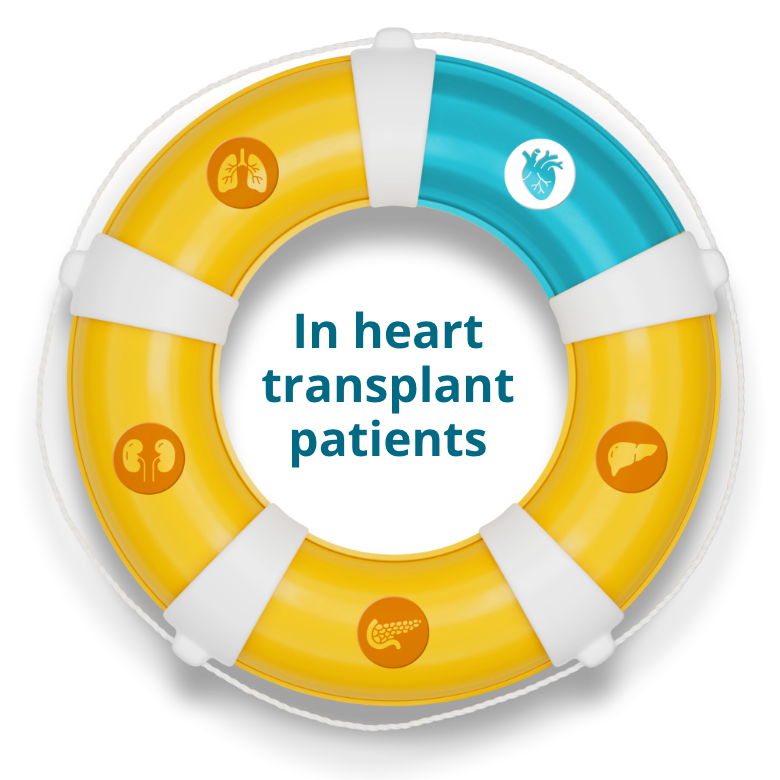
CYTOGAM®: Explore Additional Cytomegalovirus Protection for Your High-Risk Solid Organ Transplant Patients
Cytomegalovirus (CMV) is one of the most significant pathogens to infect solid organ transplant (SOT) patients, especially in high-risk mismatched CMV serostatus donors and recipients, potentially leading to severe complications including organ rejection and ultimately death.1-6
CYTOGAM® (Cytomegalovirus Immune Globulin Intravenous [Human]) (CMV-IGIV) provides combination prophylaxis against CMV with an antiviral by working outside the host cell while a standard antiviral works inside the host cell.2,3,7,8
CYTOGAM® combination prophylaxis may offer SOT patients
CMV Landscape
Discover why CMV continues to be a significant risk to SOT patients1-6
Dosing & Administration
Learn about the straightforward dosing and administration for CYTOGAM1
Mechanism of Action
Explore how the MOA for CYTOGAM works in combination with an antiviral2,3,7,8
Access & Ordering
Find out about the coverage and ordering process for CYTOGAM
Efficacy
Observe the demonstrated efficacy of CYTOGAM in lung and heart SOT patients9-11
Resources
Get tools to help you make informed decisions about individual treatment plans
Safety
Evaluate the robust safety profile of CYTOGAM1
STUDY DESIGNS
Banga and colleagues classified patients (N=319) into 2 groups, high-risk CMV SOT patients (n=82) and non-high-risk CMV patients (n=237), and the groups were compared for patient demographics, comorbidities, and post-transplant variables. The primary endpoint was 3-year survival. With 3-year survival as the dependent variable, the association of CMV status with survival was analyzed using multivariate logistic regression analysis.9
In a long-term study by Valantine and colleagues, the population receiving CMV-IGIV (n=80) comprised 27 heart transplant recipients (D+/R–) and 53 heart-lung and lung transplant recipients (R+ and/or D+) matched with historical controls who had undergone transplantation in the preceding 2–3 years. Comparative outcome measures included the 3-year incidence of CMV disease; acute rejection; survival; and incidence and death from obliterative bronchiolitis.10
A prospective cohort study by Potena and colleagues of 66 heart transplant recipients compared aggressive CMV prophylaxis (CMV-IGIV plus an antiviral) (n=21, CMV hyperimmune globulin [CMV-IGIV] plus 4 weeks of intravenous ganciclovir followed by 2 months of valganciclovir) with standard prophylaxis based on pre-transplant donor and recipient CMV serology: D+/R– received aggressive prophylaxis and R+ received standard prophylaxis. Outcome measures included CMV infection and acute rejection.11
References: 1. CYTOGAM [package insert]. Kamada Inc.; September 2022. 2. Grossi PA, Mohacsi P, Szabolcs Z, Potena L. Cytomegalovirus immunoglobulin after thoracic transplantation: an overview. Transplantation. 2016;100(Suppl 3):S1-S4. 3. Carbone J. The immunology of posttransplant CMV infection: potential effect of CMV immunoglobulins on distinct components of the immune response to CMV. Transplantation. 2016;100:S11-S18. 4. Yetmar ZA, Kudva YC, Seville MT, et al. Risk of cytomegalovirus infection and subsequent allograft failure after pancreas transplantation. Am J Transplant. 2024;24(2):271-279. doi:10.1016/j/ajt.2023.10.007. 5. Selvey LA, Lim WH, Boan P, et al. Cytomegalovirus viremia and mortality in renal transplant recipients in the era of antiviral prophylaxis. Lessons from the western Australian experience. BMC Infect Dis. 2017;17(1):501. 6. Haidar G, Boeckh M, Singh N. Cytomegalovirus infection in solid organ and hematopoietic cell transplantation: state of the evidence. J Infect Dis. 2020;221(Suppl 1):S23-S31. doi:10.1093/infdis/jiz454 7. Majewska A, Młynarczyk-Bonikowska B, Malejczyk M, Majewski S, Młynarczyk G. Possibilities of prevention and treatment of human cytomegalovirus infections including new drugs and compounds with potential application. Advancements Microbiol. 2019:58(3):291-299. 8. Acosta E, Bowlin T, Brooks J, et al. Advances in the development of therapeutics for cytomegalovirus infections. J Infect Dis. 2020;221(Suppl 1):S32-S44. 9. Banga A, Kanade R, Bollineni S, et al. Lung transplant recipients with high-risk CMV mismatch managed using a multimodality regimen over a five-year period. Poster presented at: IDWeek; October 11-15, 2023; Boston, MA. 10. Valantine HA, Luikart H, Doyle R, et al. Impact of cytomegalovirus hyperimmune globulin on outcome after cardiothoracic transplantation: a comparative study of combined prophylaxis with CMV hyperimmune globulin versus ganciclovir alone. Transplantation. 2001;72(10):1647-1652. 11. Potena L, Holweg CTJ, Chin C, et al. Acute rejection and cardiac allograph vascular disease is reduced by suppression of cytomegalovirus infection. Transplantation. 2006;82:398-405.

